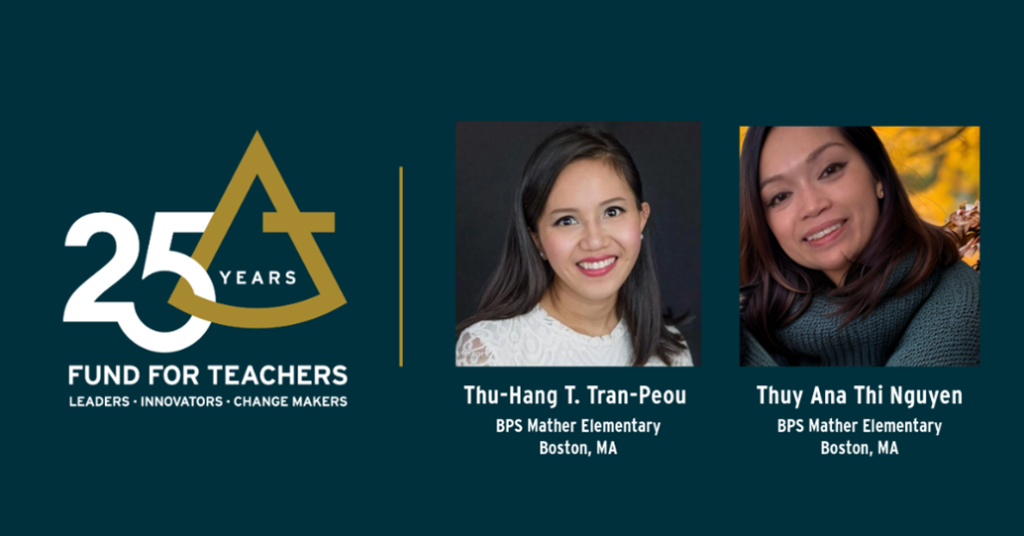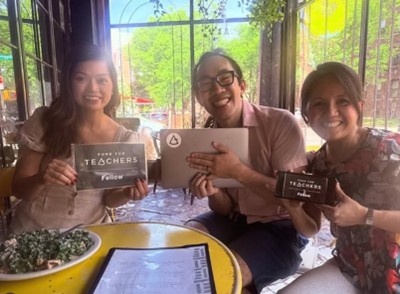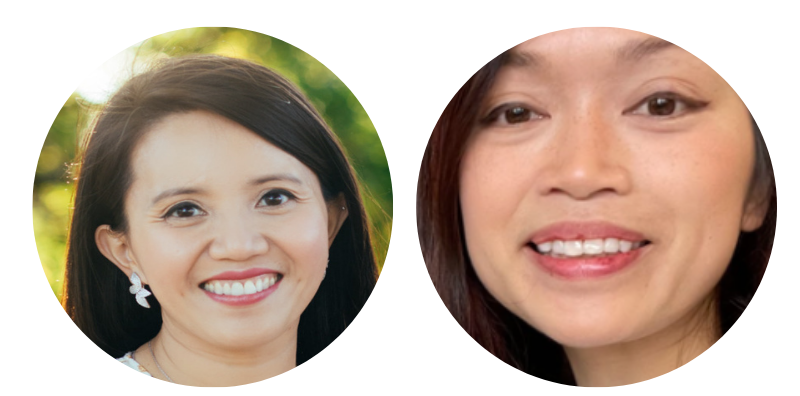“I remember setting foot on my first Boston snow in February 1992,” said FFT Fellow Thu-Hang Tran-Peou describing her arrival from Vietnam as a young girl. “It was my first encounter with tuyết (snow)—a word I had read, wrote, and pondered before but had never known. The coldness, the fragility of the white cluster melting in my hands—it felt like a metaphor for my identity as a Vietnamese immigrant and refugee.”

Beautiful, bracing and ephemeral. Everything about the life she and her family fled in Vietnam now abutted against assimilation.
“I lived in two worlds—ashamed of my Vietnamese at school and never fully confident in my English at home,” she continued. “I was told that success was when I could leave my Vietnamese roots and thrive as an ‘American’ with my new branches. Today, after 17 years as an educator, I find my reflection in the eyes of my students, who also navigate these dual identities.”
Thu-Hang and her FFT Fellow teammate Thuy Nguyen teach at Boston Public School’s Mather Elementary, the oldest public school in North America, where they are charged with implementing the Vietnamese Dual Language (VDL) program for fifth and sixth grades. (EdWeek recently reported on their work). The veteran teachers were inspired by the fellowship of 2024 Fellow Vincent Pham (Brooklyn, NY) after following his fellowship across Southeast Asia last summer and decided to design and submit their own proposal focused on ensuring that their students’ histories, heritages, and home languages are seen as assets to be embraced, not erased.

In a beautiful spirit of collaboration, Thuy and Thu-Hang met up with Vincent in New York this spring to collaborate on fine tuning their upcoming fellowship itinerary. In August, the teaching duo will navigate across Vietnam’s three regions—Ha Noi in the North, Hoi An and Hue in the Central, and Ho Chi Minh City in the South — to commemorate the 50th Anniversary of Saigon’s fall, gain linguistic proficiency in various dialects, and explore community spaces that represent the interplay of language, commerce, and culture in daily life. They will document each experience through oral interviews, videos/digital film, photography, and primary artifacts to bring back to share and teach in the classrooms.
“Over the past five decades, three generations of our Vietnamese families have navigated the complexities of displacement, survival, and identity,” wrote Thuy and Thu-Hang in their grant proposal. “From our parents, who risked their lives on perilous boats to escape conflict and rewrite their histories; our generation, navigating the tension between forgetting and forging a new identity in a foreign land; and our students, who now piece together hope for the future as the first cohort of Vietnamese bilingual learners. By embracing the diverse backgrounds of our students – culturally, linguistically, and even racially – we will create a learning environment that not only celebrates their differences but also unites them in shared pride and purpose in our Vietnamese Dual Language (VDL) Program, the first and only in the school district and Massachusetts”

Thuy and Thu-Hang are the inaugural recipients of Fund for Teachers’ Dottie Engler Follow the Learning Fellowship. Dottie served as the director of special projects at Boston Plan for Excellence and the director of external relations and development at the Harvard Graduate School of Education. However, we are most proud of her role as Fund for Teachers as a board member.
 There simply aren’t enough teacher education agencies in the US that can appropriately train and prepare teachers how to competently teach both English and Spanish literacy simultaneously.
There simply aren’t enough teacher education agencies in the US that can appropriately train and prepare teachers how to competently teach both English and Spanish literacy simultaneously.
 Our team consists of a 5th/6th grade Spanish math teacher, a 4th grade Spanish literacy teacher, a 3rd grade English literacy teacher and literacy coach, and an ESL teacher that co-teaches in 3rd and 4th grade. Working collaboratively, we’ll use our newly learned strategies and newly acquired resources to create a Spanish/English poetry unit. This would include author studies, poetry reading and writing, and shared presentations of written poetry. Both 3rd and 4th grade have poetry standards that have been notoriously
Our team consists of a 5th/6th grade Spanish math teacher, a 4th grade Spanish literacy teacher, a 3rd grade English literacy teacher and literacy coach, and an ESL teacher that co-teaches in 3rd and 4th grade. Working collaboratively, we’ll use our newly learned strategies and newly acquired resources to create a Spanish/English poetry unit. This would include author studies, poetry reading and writing, and shared presentations of written poetry. Both 3rd and 4th grade have poetry standards that have been notoriously